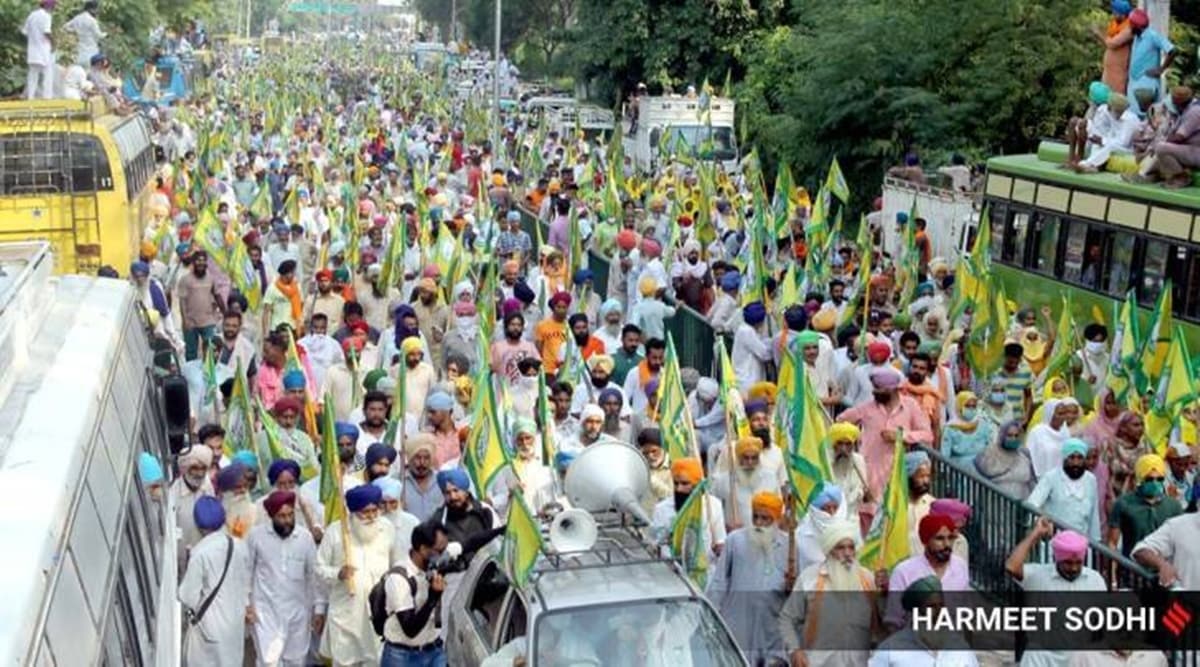 These funds are collected twice a year when the new crop comes. (Express Photo: Harmeet Sodhi/Representational)
These funds are collected twice a year when the new crop comes. (Express Photo: Harmeet Sodhi/Representational)The ongoing farmers’ agitation has also brought into focus the farm outfits for their funding and resource management. While several have been picked upon for their source of funding, the farmer outfits insist that their funding system is well-oiled and has been in place for years – the reason why they have been able to manage this protest seamlessly.
The farmers’ organisations say that their main donors are none other their own activists, farmers, adding that they have developed systematic methods to collect these funds where they record collections in the books in a transparent manner.
Further, these funds are collected twice a year when the new crop comes.
“We have two methods of fund collection which we do after every six months when the new crop comes. The funds are collected by our village-level units only as no block, district and state level units have the right to collect the funds,” said Jagmohan Singh, General Secretary, Bharti Kisan Union (BKU) Ekta (Dakaunda), one of the biggest Unions, adding that funds are collected per acre as well as per tubewell.
“Per tubewell Rs 300 is charged from our activists and if one has three tubewells then he will donate Rs. 900 and then in another method we adopt is to charge Rs 100 per acre and if any farmer is very poor we never force him to contribute,” he said, adding that in parts of Sangrur, Mansa, Bathinda, Ferozepur and Barnala district our workers even collect grains and then that is sold and the funds are deposited in the accounts of the Union.
He explained: “If a village collects Rs 50,000 then 50 per cent of this amount will go to the account of the block level unit and then block level unit will further give 50 per cent from its own account to the district Union and out of that 10% is deposited in the state level body/unit’s account.”
“Ever since this protest has started we have not accepted a single penny from any NRI, who are even our former members, family members or friends, just because we do not want to accept it without any proper registration in the law book and keeping a Chartered Accountant (CA) for that as till the time our protest is on we will not accept any foreign money even from our family and friends,” he said, adding that “we have our own funds and are managing from them”.
The other biggest farm union of Punjab BKU (Ugrahan) also collects funds at village level after every six months.
“Our union is active in around a dozen districts of the state and we have ‘Ikai’’ (village level unit) in the villages of these districts where our activists collect funds after every six months when the new crop comes and this fund is recorded in our register against the name of the donor. We never force any one to contribute but people donate as per their wish from Rs 50 to a couple of thousands even as per their ability,” said Sukhdev Singh Kokrtikalan, General Secretary, BKU (Ugrahan).
Jagsir Singh, BKU (Ugrahan) leader from Bathinda, informed that “out of this collection we give Rs 15,000 to our block, district and state level units which include Rs 7,000 to block level and Rs 3,500 each to the district and state level units. Every unit has their own accounts, which are always on joint name. The money is spent from these accounts as per the programme. For instance, if it is a state level programme then the state body will spend from its account and if it is village level then the village body will spend from its account and so on”.
He added: “Even when the protests at Tikri Border has entered in its 27th day today every village unit is taking care of the protestors of their respective villages where village-wise langars are being prepared and served at dharna site and every village is managing from their own funds and if any village is small then the other big village or, block/district and state units come forward to share their burden.”
He further pointed out that everyone at the protest site has gone after making their own arrangement for ration, utensils bedding, and tents to cover the trolleys.
“Everyone is sharing the burden so that protest runs smoothly,” he added.
The press secretary of Punjab Kisan Mazdoor Sangharsh Committee (PKMSC) Baljinder Singh also informed that the collection is done twice a year from the villages where their units are active and proper accounts are maintained from village to state level and the money is used for dharnas and protests arrangements. “In this dharna every activist has tried to manage his ration and bedding, and travelling expenditure on their own apart from their six monthly contributions,” he said.
Almost all the farmers unions of the Punjab, sources said, have adopted more or less similar methods to collect funds and manage the movement.
“We are managing from our own funds and also collecting ration village wise to send it to the dharna site at Singhu border as every week we send vehicles of rations, blankets etc. as every villager wants to contribute whether he is farmer or not,” said farmer Vijay Singh, a BJP activist protesting against the three laws under Pagari Sambhal Jatta organisation from Mukerian.